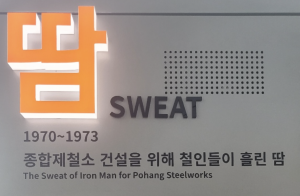Pohang: POSCO Museum
Photo essay of wall text of POSCO Museum of Pohang

Photo essay of wall text of POSCO Museum of Pohang

XXX

1) "It's a community that's all too aware that declaring a crisis doesn't actually mean anything significant will change...Within the last 12 months, there have been multiple "crisis" states declared in Indigenous communities across the country, including even the entire territory of Nunavut—where 84 percent of the population are Inuit."
2) " "What do you find 20 years ago? The same conversations we are having now about suicide. The same conversations we are having now about the lack of mental health. The same conversations that we are having around socio economic development," Tait told VICE."
3) "One of the reasons Canada conveniently forgets the multiple recommendations and reports around youth suicide and mental health is that when it comes to Indigenous peoples they are considered "the other" "
The authors support their argument many ways, one being how that the rates of HIV/AIDS are so positively linked and correlated with social arrangements that it is often referred to as social disease. HIV commonly effects those that are poor and disease rates are fueled by gender inequality, racism and poverty. The article discusses how structural violence has influenced HIV progression. The article cites that structural violence influences diagnosis rates, staging and treatment. The also article references a study done in Baltimore which reports racism and poverty forms of structural violence and the effects on excess mortality among African Americans without insurance- ultimately showing they were more likely to to be susceptible. The authors also used other historical data and research to support heir claims. Efforts through Partners in Health were made to prevent the spread and transmission of diseases in Haiti. The efforts made in Haiti and Rwanda were cited, both the positives and negatives. The article also discusses ways to incorporate more interventions to help eliminate any social influences of disease.
This article focuses on gender based violence and its ties with medical humanitarianism. The effects humanitarianism has on other violent acts versus ones effecting gender based acts such as rape and assault. A main point made in this article is the fact that special humanitarian attention to gender based violence in fact has a negative effect on the overall addressing of the issue in its entirety. The reason behind this being cited is the fact that it depoliticizes the issue when unprecedented attention is given to gender based violent acts. The article then notes that by paying attention to why this is failing, we can think of new ways of addressing this issues and violence, making it more equal.
The author is Adriana Petryna, a professor of Anthropology at the University of Pennsylvania. In addition to her work as at the University, Dr. Petryna has written several books and articles focusing on the effects of cultural and political forces on science and medicine. Other interests include social studies of science and technology, globalization of health, medical anthropology, and anthropological methods
A main concern is the fact that no disaster will ever be the same. A hurricane in one area will be very different in another area, despite the same source of destruction. This is because each areas has a different population, different needs and different services available in each area. The most challenging part is the ability to foresee what might be good resources or equipment or forms of medical care and best to supply at each different disaster since each one is unique.
There are numerous authors of this paper. Foghammar is from the Stockholm International Peace Research Institute in Sweden, as well as the Karolinska Institute in Sweden. Jnag, Kyzy, Sullivan and Irwin are also from Stockholm International Peace Research Institute. Weiss is from the Fafo Research Institute in Norway and Fall is from King's College London in the UK. Foghammar is very active in foreign affairs as well as economics, global health and political science fields. Suyoun Jang researches at SIPRI in the Security and Development Program and her focus is on fragile states, security and development. Kyzy is also a researcher at SIPRI, working on the impact evaluation of the peace program in Kyrgyzstan. Weiss has a PhD in social anthropology and her research areas include conflict, gender, political anthropology, migration and social suffering and torture. Their publications all relate to their respective fields of study within the anthropology and social science world.
This chapter from the work "Medicine, Rationality, and Experience: an anthropological perspective" seems to most frequently appear on websites for various Universities and Colleges. Moreover, the work as a whole seems to have been cited several times by subsequent reports further defining patient narration and medical relations.